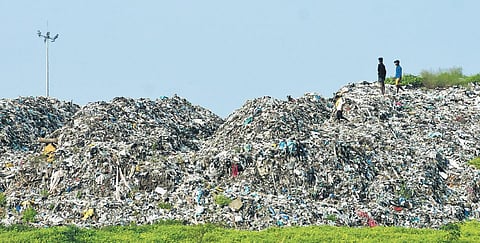

CHENNAI: Tamil Nadu can process only about 66% of the waste it generates, and the remaining 34% ends up in landfills every day, show municipal administration data. The state generates 15,240 TPD (tonnes per day) of waste, as of October, and is able to process only 10,086 TPD, leaving over 5,000 tonnes in landfills daily.
Of this, about 8,196 TPD is wet waste and 5,519 TPD is dry waste, the rest being inert and silt, according to the data recently submitted to the principal bench of the National Green Tribunal (NGT). Municipal administration officials said they are working to increase the waste-processing capacity by 9,066 TPD at a cost of Rs 1,222 crore under various schemes including the Swachh Bharat Mission.
As far as liquid waste (sewage) is concerned, the state generates 4,001 MLD (million litres per day), and 1,031 MLD goes untreated. About Rs 4,200 crore has been committed under various schemes, including AMRUT, to increase the treatment capacity. Unprocessed solid waste ending up in landfills pollutes the environment with leachate and toxic landfill gases (largely methane) while untreated sewage that ultimately finds its way to waterbodies not only impacts aquatic ecosystems but also runs the risk of entering the food chain.
The leachate from landfills should ideally be treated in sewage treatment plants without letting it seep into the ground, Sultan Ahmed Ismail, member of the State Planning Commission, said, adding that geomembranes can help prevent seepage.
“There also has to be commitment from residents. When we ask why they don’t segregate waste at home, they say even if waste is segregated, it gets mixed up in landfills. Local bodies can counter this by being transparent about the chain of processing waste right from when it is handed over to them,” he said.
Official: Waste must be segregated at source
There are areas like Panampilly Nagar in Kochi, where most residents take up home composting and have been continuing it for the last 20 years, TK Ramkumar, advocate and former chairman of the Local Area Environment Committee appointed by the Supreme Court Monitoring Committee, said.
“To reduce waste in landfills, decentralisation of waste management at the ward levels is key. But, there is money to be made in long-distance transportation of waste so contractors often cite a variety of reasons to avoid processing waste in the wards.
A large part of decentralisation would need waste to be segregated at the source,” he said. Tamil Nadu had 269 locations, including landfills, where legacy waste was dumped. Of these, 91 have been cleared of waste. Work is on in the other 178 locations, where 121.41 cubic metres of waste remains to be cleared.